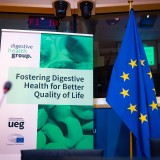Notes to Editors
We kindly ask that a reference to UEG Week is included when communicating any information within this press release.
For further information or to arrange an interview, please contact Luke Paskins on +44 (0) 208 154 6393 or [email protected]
About Esther Colomier
Esther Colomier is a joint PhD researcher at KU Leuven, Belgium, and the University of Gothenburg, Sweden.
About Professor Ami Sperber
Professor Ami Sperber is from the Faculty of Health Sciences at Ben Gurion University of the Negev, Beer-Sheva, Israel, and is lead author of the 2021 Global Epidemiology Study of Functional Gastrointestinal Disorders.
About UEG
UEG, or United European Gastroenterology, is a professional non-profit organisation combining all the leading European medical specialist and national societies focusing on digestive health.
Our member societies represent more than 30,000 specialists from every field of gastroenterology. Together, we provide services for all healthcare professionals and researchers, in the broad area of digestive health. The role of UEG is to take concerted efforts to learn more about digestive disease by prevention, research, diagnosis, cure and raising awareness of their importance.
To advance the standards of gastroenterological care and knowledge across the world and to reduce the burden of digestive diseases, UEG offers numerous activities and initiatives, including:
- UEG Week: Organising the best international multidisciplinary gastroenterology congress in the world.
- UEG Research: Supporting cooperation and excellence in digestive health research.
- UEG Journal: Delivering clinical information for digestive health with authority.
- UEG Education: Providing learning opportunities in multiple formats.
- Quality of Care: Improving clinical practice to reduce health inequalities across Europe.
- Public Affairs: Acting as the united voice of European Gastroenterology towards the public and policy makers.
Find out more about UEG’s work by visiting www.ueg.eu or contact: [email protected]









Please log in with your myUEG account to post comments.